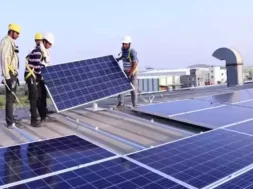
India’s G20 Presidency: An Opportunity to Steer the World Toward Inclusive and Sustainable Growth – EQ Mag
-
India’s theme for its G20 Presidency, “Vasudhaiva Kutumbakam” (One Earth – One Family – One Future) is aiming to build unanimity to address global challenges collectively and effectively.
-
As a leading development partner of India, ADB is supporting India’s G20 Presidency on its key priorities: supporting cities as engines of economic growth, clean energy transition, and shaping a global health agenda.
-
India has an important opportunity during its G20 Presidency to establish a legacy of success across these critical challenges and it has friends that it can rely on for support.
India’s G20 Presidency this year presents an exceptional opportunity for the country to spearhead a collective approach to tackle multiple, complex, and interconnected challenges, while placing, front and center, the aspirations and needs of the developing world.
The COVID-19 pandemic, supply chain disruptions, climate change, food and energy security risks, geopolitical tensions, inflation, and a looming debt crisis all contribute to economic slowdown and uncertainty in global economic growth.
India has set “Vasudhaiva Kutumbakam” or “One Earth – One Family – One Future” as the theme for its G20 Presidency, rightly aiming to instill a sense of unanimity essential for addressing these global challenges collectively and effectively. Prime Minister Narendra Modi further envisions India’s G20 agenda to be “inclusive, ambitious, action-oriented, and decisive.” India’s successes and experiences are critical to tailoring global solutions.
India’s G20 priorities
India has identified a wide array of cutting-edge priorities that are being deliberated by various G20 working groups, to help address the key challenges we face and to plan for a better future. Let me highlight three of them.
The first agenda relates to financing tomorrow’s cities and establishing them as the foremost engines of economic growth. While cities generate over 80% of global gross domestic product, unplanned and rapid urbanization constrain their economic potential. It is estimated that by 2050, nearly twice as many people will live in cities. To sustain their economic potential, cities need to become more livable through upgraded infrastructure and services, such as reliable water, transport, power, waste management, and affordable housing.
Cities must also be nurtured as hubs for entrepreneurship, jobs, and skill development. This requires massive investments in smart, sustainable, and resilient urban infrastructure. Globally, roughly $5.5 trillion needs to be invested in urban infrastructure annually over the next 15 years. The private sector is an important partner in these needed investments. The G20 platform could be used to mobilize international support to bridge this financing need.
The second agenda where India can lead the way is in energy transition. Enabling an orderly and just transition from carbon-intensive energy to renewable energy would not only help combat climate change, but also help bolster energy security, raise economic productivity and create jobs, improve environmental outcomes, and prune health costs. In other words, decarbonization is development.
Today, India is the world’s third-largest producer of renewable energy, with further expansion underway. India’s success in scaling up solar energy, along with recently announced programs such as the National Hydrogen Mission, Production-Linked Incentives for electric vehicles and the manufacture of solar technologies and battery energy storage, and incentive mechanisms for supporting offshore wind, all allow the country to lead by example and drive global collaboration to reduce the cost of achieving net-zero emission.
India has made efforts for the G20 to focus on the need to expand and diversify critical minerals and renewable energy supply chains for economies to secure uninterrupted and affordable access to renewable energy and energy storage, both prerequisites for the overall transition to net-zero emission.
The third agenda relates to health care. The COVID-19 pandemic highlighted the compelling need for a united global approach to fortify health systems to effectively address emerging health crises. India’s G20 Presidency is a medium of change towards more resilient, responsive, and sustainable health systems and to advance previously established G20 pandemic preparedness efforts.
G20 can help shape a global health agenda focused on ensuring universal, affordable, and quality health services. Giving priority to enhancing health emergency prevention and preparedness (with focus on One Health and linkages between climate change and health), strengthening cooperation in the pharmaceutical sector, and leveraging digital health innovations and solutions to aid universal health coverage, is critical. India can lend its experience in framing a successful national digital health architecture through supportive regulatory environment, private-public partnerships, and digital health interventions such as CoWIN and National Digital Health Mission.
ADB’s support for India’s G20 presidency
As a leading development partner of India, the Asian Development Bank (ADB) is supporting India’s G20 Presidency on these key priorities. To transform Indian cities into “Cities of Tomorrow”, ADB will assist in “Creating Investable Cities” that can mainstream climate resilience; leverage mobilization of resources such as municipal bonds, innovative climate finance, and new sources of revenue through appropriate urban planning and transit-oriented development; and mobilize much-needed private sector investments.
ADB is mainstreaming just energy transition within all of its operations. It will work with the government and large financial intermediaries in establishing pools of low-cost finance to fund residential solar rooftop, electric vehicles, and energy storage investments. In partnership with the International Solar Alliance, ADB is supporting the government in developing a virtual Center of Excellence on Green Hydrogen.
ADB is discussing the development of a Climate and Health Hub (CHH) to galvanize local, regional, and global climate and health actions under India’s G20 Presidency. ADB supports the G20 Presidency’s Global Initiative on Digital Health and in transforming the National Centre for Disease Control into a Regional Center for Disease Control with global reach.
India has an important opportunity during its G20 Presidency to establish a legacy of success across these critical challenges and it has friends that it can rely on for support.










